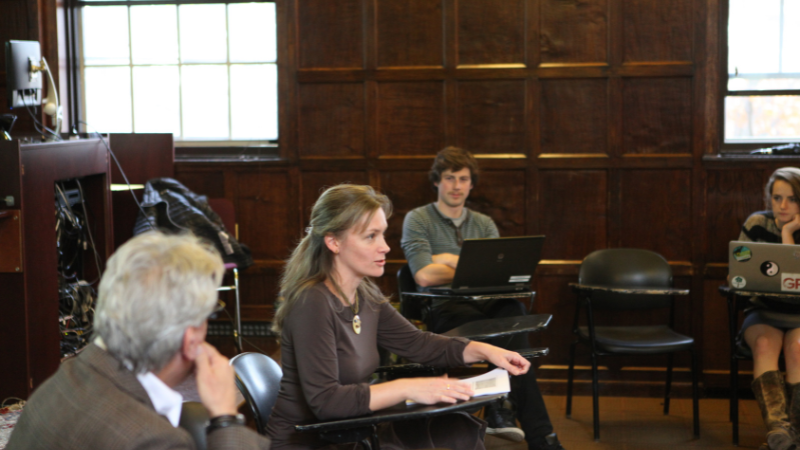
Professor Oxana Shevel Steps Into a New Role as Vice President of ASEEES
By Hannah Campeanu, MALD 2025 Candidate, The Fletcher School
Professor Oxana Shevel, director of the International Relations Program and Associate Professor of Political Science at Tufts University, has stepped into her new role as Vice President of the Association for Slavic, East European, and Eurasian Studies (ASEEES) for 2025. She will hold the position for one year, and will then take on the role of president of the association for one year beginning in 2026.
Created in 1948, ASEEES is the biggest scholarly association in North America, uniting scholars and practitioners of Slavic, East European, and Eurasian studies, with 3,200 members across academic disciplines. ASEEES is well known for its Annual Convention, its chief publication, “Slavic Review,” and its book prizes and graduate student grants. Professor Shevel served as the Annual Convention Program Committee Chair last year, leading the committee in charge of selecting proposals for the annual convention program. Previously she also served on one of the association’s book prize committees.
As the new vice president, Shevel sits on the Association’s board with the president, previous president, and nine other board members. The board meets periodically two to three times per year and works on organizing the Annual Convention, among other responsibilities. When interviewed on January 30th, Shevel shared that the board’s next meeting will likely discuss how the Trump administration’s restrictions on federal funding and requirements to scrub “controversial” language from course syllabi may affect ASEEES members. While the association is mainly funded through member dues, the board may decide to seek funding from other sources.
When asked what she saw as the priorities of ASEEES during her tenure, Shevel noted that there are many aspects of the organization’s work that remain constant under different boards, including its conference, publications, prizes, and professional development of younger scholars. However, she stated that there is an ongoing conversation in the field about whether Slavic, Eastern European, and Eurasian studies have historically been too Russia-centric. Some scholars, including Shevel, feel that the field needs to pay more attention to research agendas and voices in the field that have been historically marginalized, including indigenous peoples in the region. Others feel that the field’s focus on Russia is merited, given its political and historical importance in the region. This discussion is ongoing within the association and can impact decisions about what events and panels at the conference ought to be prioritized.
This discussion is part of a larger conversation in the field on whether Eurasian studies need to be decolonized, what decolonization means in this region, and whether the USSR can be considered a colonial power. Shevel noted that this conversation has taken on more weight following the Russian invasion of Ukraine. The invasion raised the profile of Ukrainian studies in the field and called into question the Russo-centric lens through which not only Ukraine but other non-Russian regions have often been viewed. Few now question that Ukrainian studies is a worthy area of research and distinct from Russian studies.
She said, “At Tufts, a new class I offered on Ukrainian politics was oversubscribed, and we had to raise the enrollment cap twice.”
When the war broke out, ASEEES made a statement condemning Russia’s invasion and supporting the people of Ukraine. The association also provides funding for scholars from the region, including scholars displaced due to Russia’s war on Ukraine. Shevel explained that she expects the conversation around decolonization to continue past the end of the war.
When asked about her role in the future of ASEEES, Shevel emphasized her priority of supporting and encouraging young people in the study of the region. She also stated that she will use her role as vice president, and subsequently president, to continue to promote conversation around decolonization and to highlight different voices. She also hopes to contribute to this conversation and other discussions in the field of Russian, East European, and Eurasian studies through her scholarship.
